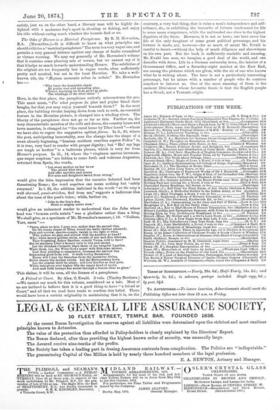The Odes of Horace in a Metrical Paraphrase. By R.
M. Hovenden, BA. (Macmillan.)—It is difficult to know on what principles one should criticise a" metrical paraphrase." The term is a very vague one, and permits a very general defence against any charge of faults committed or virtues wanting. We may say generally of Mr. Hovenden's volume that it contains some pleasing sets of verses, but we cannot say of it that it helps us much towards understanding Horace. The subtleties of the original are too frequently lost in vague words, often sufficiently pretty and musical, but not in the least Horatian. We take a well- known ode, the "1Equam memento rebus in arduis." Mr. Hovenden has :—
"Why leave the hospitable shade By poplar cast and spreading pine.
Whence, hurrying on from grove to glade, The wiudinge of the river shine"?
Hero, in the first place, the paraphrase entirely misconstrues the quo. This must mean, "For what purpose do pine and poplar blend their boughs, but that you may enjoy yourself beneath them?" In the next place, the babbling rivulet leaping down from rock to rock, an essential feature in the Horatian picture, is changed into a winding river. The liberty of the paraphrase does not go so far as this. Further on, the very characteristic mention of the villa and domus, the country house and town mansion, is changed for "the rural home by Tiber laved "—whore we have also to regret the suggestive epithet flavus. In ii., 20, where the poet, anticipating immortality, sees the change into the shape of a swan already beginning, "Iamiam residunt cruribus asperm Polies " is, it is true, very hard to render with proper dignity; but "Ha! my logs are tough as leather S' is a ludicrous phrase, which is very far from Horace's purpose. In iii., 14, where the " virginum metres iuventim- quo nuper sospitum" are bidden to come forth and welcome Augustus, returned from Spain, the words,
"Let every mother on her brow The sacred fillet twine.
And offer sacrifice and praise For sons and daughters saved from wrong,"
would give the false impression that the enemies defeated had been threatening Rome ; the word sospitum can mean nothing but 'safely returned.' In i. 22, the addition italicised in tho words "at the song a wolf alarmed, panic-stricken, fled from me," suggests a ludicrous idea -about the tone of the poet's voice ; while, further on,
"Juba in the lion's den,
Brute so mighty never slew,"
would give an unlearned reader to understand that the Juba whose land was " leonum arida nutria" was a gladiator rather than a king. We shall give, as a specimen of Mr. Hovenden's manner, i. 18. "Nullam, Tare, sacra ":—
" Yarns, plant no tree, I pray you, rather than the sacred vine, On the sunny slopes of Tibur, round the walls Catillus planned; Pain and sorrow, spectre-couple, vanish in the light of wino. Why endure we pain and sorrow with the antidote at hand? Who, when merry goblets circle, croaks of war and dire distress, Thee forgetting, father Bocchus, comely Venus, cold to thee? But let madmen Liter's bounty turn to riot and excess, Let the drunken Centaurs warn them of the vengeful Lapithee, Warn them, too, the Wine-God's anger with Sithonian misuse, Lest they, yielding to temptation, overpass the narrow line Separating good from evil. 0 truth-loving Bassareus Never will I tear the branches from thy mysteries divine, Never shame thy modest revels. Let the Berecynthine horn, Let the cymbal shrill be silent ; self-love kindles as they pass, While vain-glory ever higher lifts the empty head of scorn, And rash faith betrays her secret through a bosom clear as glass."
This claims, it will be seen, all the licence of a paraphrase.


































 Previous page
Previous page